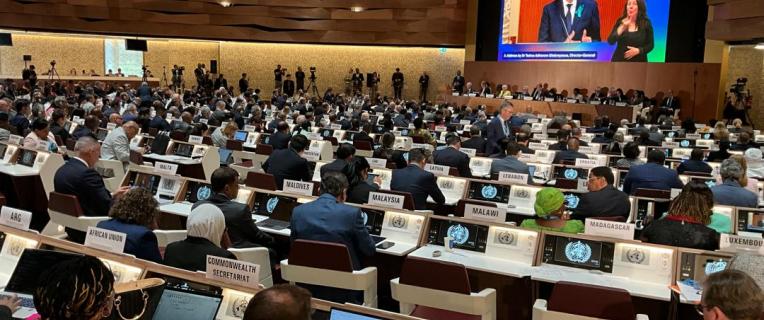Toward a Better Prepared World: WHO Reaches a Milestone with the Pandemic Agreement

On Tuesday, during a plenary session of the World Health Assembly, the Member States of the World Health Organization (WHO) adopted a groundbreaking international agreement aimed at strengthening pandemic prevention, preparedness, and response. The result of over three years of negotiations launched in the wake of the global COVID-19 crisis, this pact marks a historic turning point in global health governance.
An Agreement Born of Urgency and Experience
Adopted under Article 19 of the WHO Constitution, the Pandemic Agreement is the first global legal instrument specifically dedicated to pandemic management. It aims to address the shortcomings exposed by the COVID-19 pandemic, particularly in terms of equity, cooperation, and response speed.
“I commend WHO Member States for their commitment to act together to better protect the world,” said WHO Director-General Dr. Tedros Adhanom Ghebreyesus. “This agreement will enable a faster, fairer, and better-coordinated response to any future pandemic threat.”
A Foundation for Global Action
The adopted text lays the groundwork for strengthened collaboration among countries, international organizations, civil society, and the private sector. It emphasizes the principles of equity, solidarity, national sovereignty, and respect for human rights.
A key component of the agreement includes the creation of a Pathogen and Benefit-Sharing System (PABS), through an annex that will be negotiated separately. This mechanism will ensure equitable access to essential health products such as vaccines, diagnostics, and treatments in the event of a pandemic emergency. Pharmaceutical manufacturers will commit to reserving 20% of their production for rapid and equitable distribution, overseen by the WHO.
Structured Logistical and Financial Support
The agreement also provides for the establishment of a Financial Coordination Mechanism and a Global Supply Chain Network (GSCL). These structures aim to remove logistical and financial barriers to accessing response tools, particularly for the most vulnerable countries.
A Step Forward, Not the Finish Line
Although the Agreement has been adopted, its effective implementation will depend on ratification by at least 60 Member States—a step expected after the adoption of the PABS annex. This process is expected to conclude next year, following national and international debates.
A collective Effort Applauded
Dr. Esperance Luvindao, Namibia’s Minister of Health and Chair of Committee A, highlighted the historic nature of the agreement: “We have chosen to unite, as one world, to protect our children, our elders, and our health workers. It is our duty to humanity.”
Dr. Tedros also praised the work of the Co-Chairs of the Intergovernmental Negotiating Body (INB), Ms. Precious Matsoso (South Africa) and Ambassador Anne-Claire Amprou (France), as well as the dedication of the Bureau and WHO Secretariat.
A Lesson in Post-COVID Solidarity
Ultimately, the Pandemic Agreement symbolizes a lesson learned from a global tragedy. By building a fairer and more coordinated response, the international community signals its determination to never be caught off guard again.
A better prepared world begins now.
Written by Clavère NKEN, Head of COMMUNICATION, Ministry of Public Health
Le Minsante

la santé, un avenir prometteur.
la vision de développement à long terme du Gouvernement est l’accession du Cameroun au stade de pays émergent aussi bien du point de vue économique qu’industriel à l’horizon 2035. Dans cette perspective, le rôle du secteur de la santé est fondamental dans la mesure où il ne saurait y avoir de développement sans une bonne santé des populations.
Vidéos / Audios
- 1 of 65
- >>
Notes d'information / Communiqués
- LISTE DES FORMATIONS SANITAIRES DE CATEGORIE D SANS AUCUN DOCUMENT ADMINISTRATIF REPERTORIE
- Press release/many health centres and clinics operating illegally throughout the country have been identified
- Communiqué de presse du MINSANTE / centres de sante et cabinets de soins exerçant en situation irrégulière sur le territoire national
- Internal Call for Applications HeSP Project
- Avis d’appel à candidature interne Projet HeSP
- National Strategic Plan for Reproductive, Maternal, Newborn, Child and Adolescent Health and Nutrition (NSP/RMNCAH-NUT) 2024-2030
- Plan Stratégique de la Santé de la Reproduction Maternelle, Néonatale, Infanto-Juvénile, de l’Adolescent et de la Nutrition (PSN-SRMNIA-NUT 2024-2026)
- FAQ Mpox.pdf

























